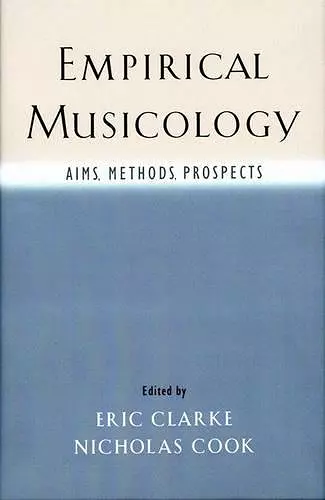Empirical Musicology
Aims, Methods, Prospects
Nicholas Cook editor Eric Clarke editor
Format:Paperback
Publisher:Oxford University Press Inc
Published:16th Sep '04
Currently unavailable, and unfortunately no date known when it will be back
This paperback is available in another edition too:
- Hardback£76.00(9780195167498)

The study of music is always, to some extent, "empirical," in that it involves testing ideas and interpretations against some kind of external reality. But in musicology, the kinds of empirical approaches familiar in the social sciences have played a relatively marginal role, being generally restricted to inter-disciplinary areas such as psychology and sociology of music. Rather than advocating a new kind of musicology, Empirical Musicology provides a guide to empirical approaches that are ready for incorporation into the contemporary musicologist's toolkit. Its nine chapters cover perspectives from music theory, computational musicology, ethnomusicology, and the psychology and sociology of music, as well as an introduction to musical data analysis and statistics. This book shows that such approaches could play an important role in the further development of the discipline as a whole, not only through the application of statistical and modeling methods to musical scores but also--and perhaps more importantly--in terms of understanding music as a complex social practice.
Empirical Musicology provides a much-needed survey of scientific, quantitative approaches to the study of music. It is typically English in its emphasis on data gathering and analysis rather than theory building. Distinguished authors contribute chapters to a broad range of musical disciplines, including ethnographic and sociological investigations, the study of musical performance, computational modeling of musical structures, and psychoacoustics. * Fred Lerdahl, Fritz Reiner Professor of Music, Columbia University *
Empirical Musicology manages to fulfill three important functions. It provides a comprehensive review of the historical development of empirical approaches within musicology. It functions as a how to primer for anyone wishing to get started in the field. Above all, it adopts a critical yet positive approach to empirical work, discussing both potentials and limitations, and showing how quantification and measurement may enhance and clarify the task of musical interpretation and understanding. It will be useful not only to musicologists, but to researchers in any discipline which engages in systematic study of music.. * John Sloboda, Unit for the Study of Musical Skill and Development, Keele University, UK *
ISBN: 9780195167504
Dimensions: 235mm x 165mm x 17mm
Weight: 345g
240 pages